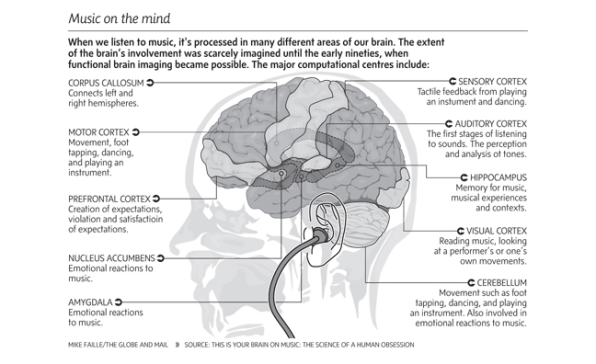The Science Behind Music
It almost seems that everyone listens to music but how does it affect our brains?

Parts of the human brain that function when listening to music
Looking around it is easy to see that just about everyone listens to music and all have different preferences for what genres and artists they enjoy. Music can make someone feel a certain way, but what is the science behind it all?
Music is considered to be personal and can help one to feel self-aware and social relatedness. Some scientists suggest that music that is more sorrowful is linked to the hormone prolactin which is a chemical that helps to suppress grief. This is the bodies way for preparing itself for a tragic event and if an event never occurs the body is just left with a mix of opiates. This reaction is often triggered by happy or sad memories recollected by the music. A new study discovered that, for some people, sad songs are negative and distressing because it is linked to unhappy memories. However, researchers from the United Kingdom and Finland discovered that listening to melancholy music is pleasing to people and improves their mood.
Music in general can be helpful in many ways. In the US, two medical institutes have proven that listening to your favorite song can even reduce pain. Patients who had just undergone spinal surgery were tested using music theory and they reported that their pain levels had reduced compared to those who had not participated. Another benefit, songs at a moderate sound level promote creativity. A moderate level would be at about 70 decibels which is around the same volume as a vacuum cleaner. Music without lyrics at such a tone could be soothing, improve mood, productivity, and creativity as well.
Another study had been done comparing songbirds listening bird songs and humans listening to music. The result was with some kinds of music triggered a change in the amygdala in both humans and birds. The responses that were most prominent were pleasure, comfort, and pain. Music is connected to many parts of the brain and can set off different reactions. A few parts would be the Cerebrum, Cerebellum, Limbic System, and the Auditory Cortex. The Cerebrum what creates images and memories connected to the song, the Cerebellum is the part that makes you want to dance and move, the Limbic System connects the listener’s emotions, and the Auditory Cortex is what analyzes rhythm, speed, and auditory parts of music for the brain. Other reactions may also take place while listening to your favorite songs such as, dilated pupils, rise in blood pressure, and a faster pulse.
According to fastcompany.com, the kind of music we listen to can actually predict ones personality.
- Blues fans have high self-esteem, are creative, outgoing, gentle and at ease
- Jazz fans have high self-esteem, are creative, outgoing and at ease
- Classical music fans have high self-esteem, are creative, introvert and at ease
- Rap fans have high self-esteem and are outgoing
- Opera fans have high self-esteem, are creative and gentle
- Country and western fans are hardworking and outgoing
- Reggae fans have high self-esteem, are creative, not hardworking, outgoing, gentle and at ease
- Dance fans are creative and outgoing but not gentle
- Indie fans have low self-esteem, are creative, not hard working, and not gentle
- Bollywood fans are creative and outgoing
- Rock/heavy metal fans have low self-esteem, are creative, not hard-working, not outgoing, gentle, and at ease
- Chart pop fans have high self-esteem, are hardworking, outgoing and gentle, but are not creative and not at ease
- Soul fans have high self-esteem, are creative, outgoing, gentle, and at ease
We asked a few people questions to see if they fit the predictions above and turns out, for the most part, they did. First we asked what their favorite genre of music is, then, to describe themselves. These are the results:
Judson Johnson

Favorite Genre: Country
Description: Hardworking, reserved, and anxious
Ryan Gibson

Favorite Genre: Rap
Description: Outgoing and carefree
Mia Simmons *center*

Favorite Genre: Pop
Description: Short tempered, outgoing, sensitive, and hardworking
Music is an important thing in our lives and for our brains. Different songs can have different effects on your mind but it seems as if every song has a special meaning or feeling connected to it. It can set off nostalgia from a good or bad time in your life or without realizing it the music you are listening to now will do the same thing in the future.
Sources: fastcompany.com, livestrong.com, news.itmo.ru, sciencealert.com, cloudcovermusic.com

Grade: 10
Position: staff writer
Favorite Hobbies: soccer, cooking, and photography
Elle Schoedel is currently a sophomore at North Allegheny...

